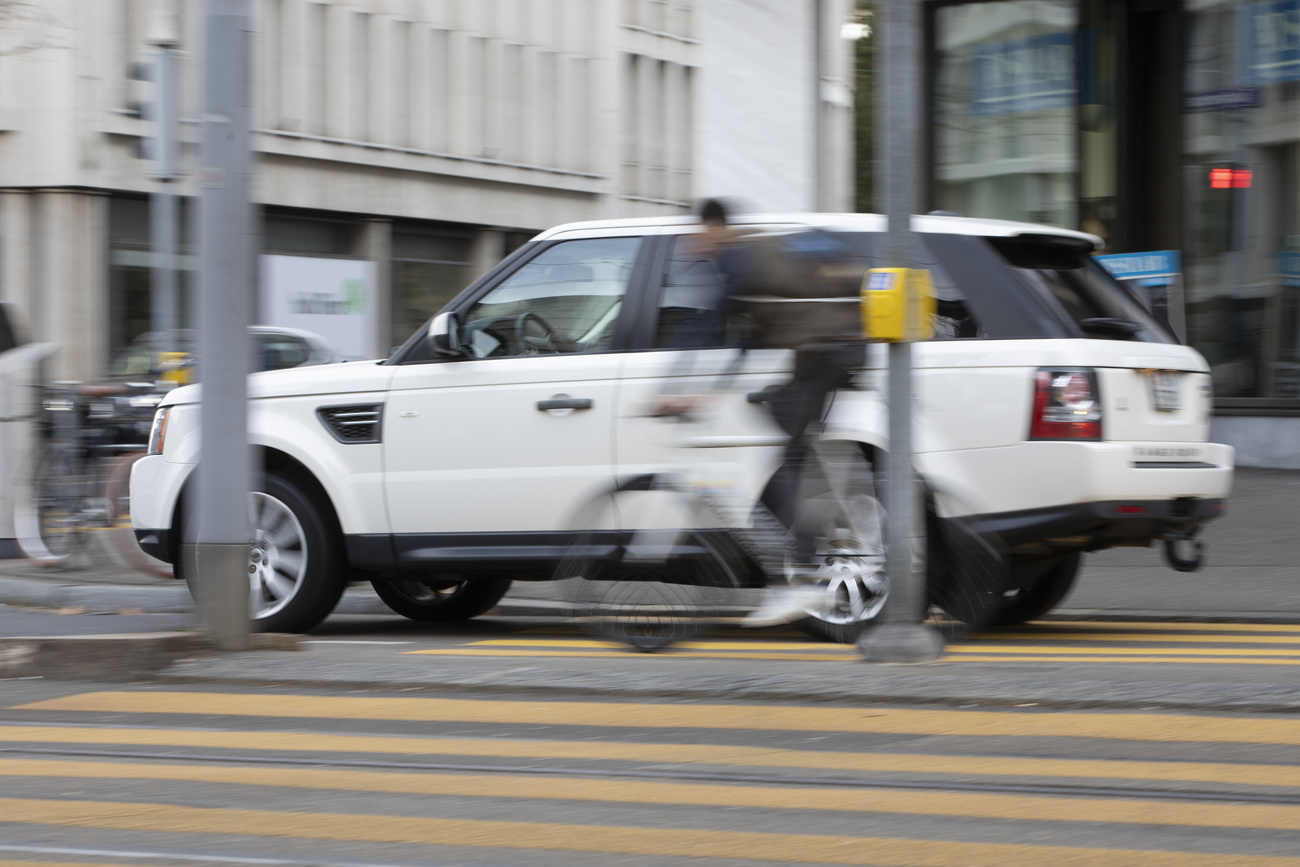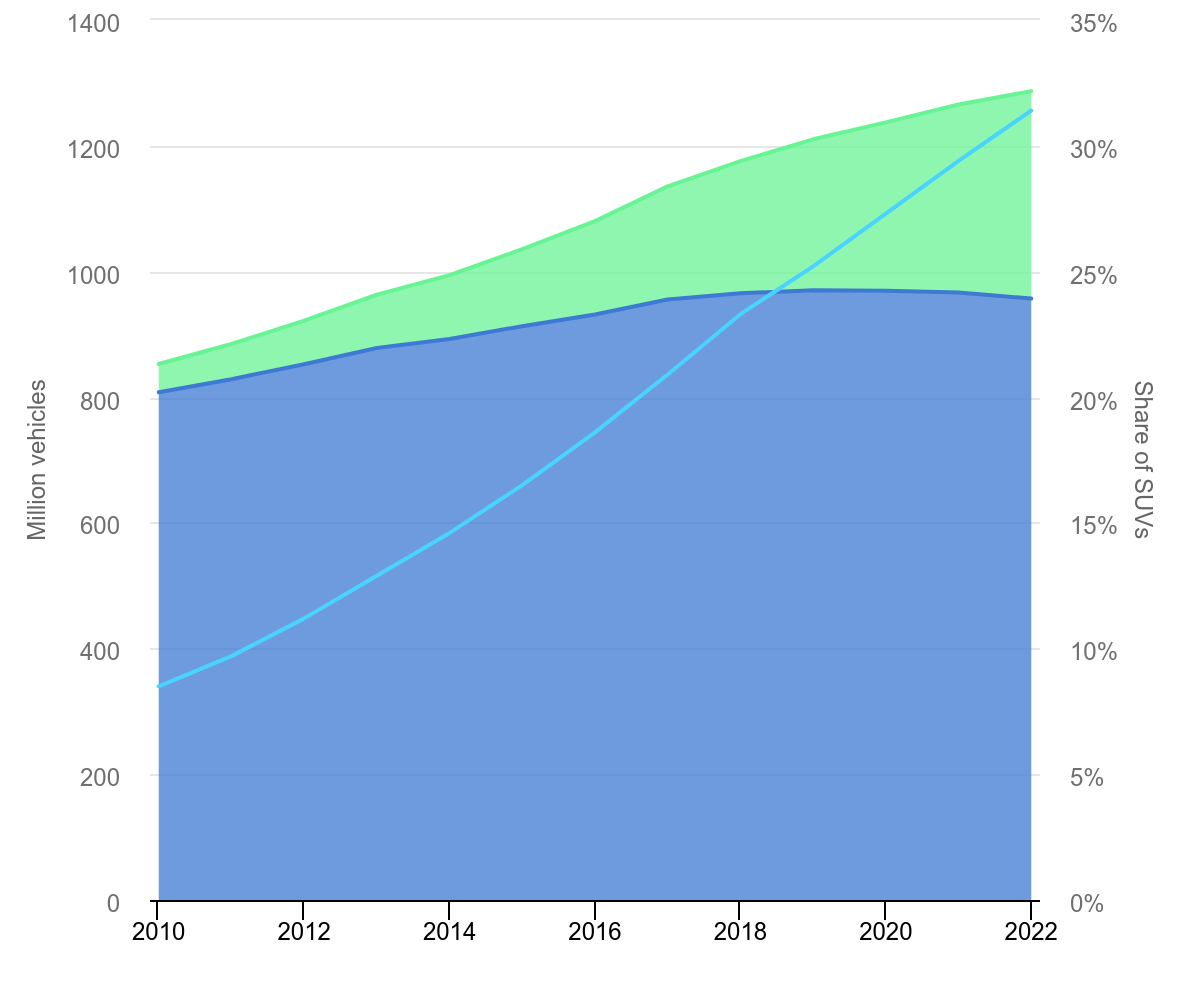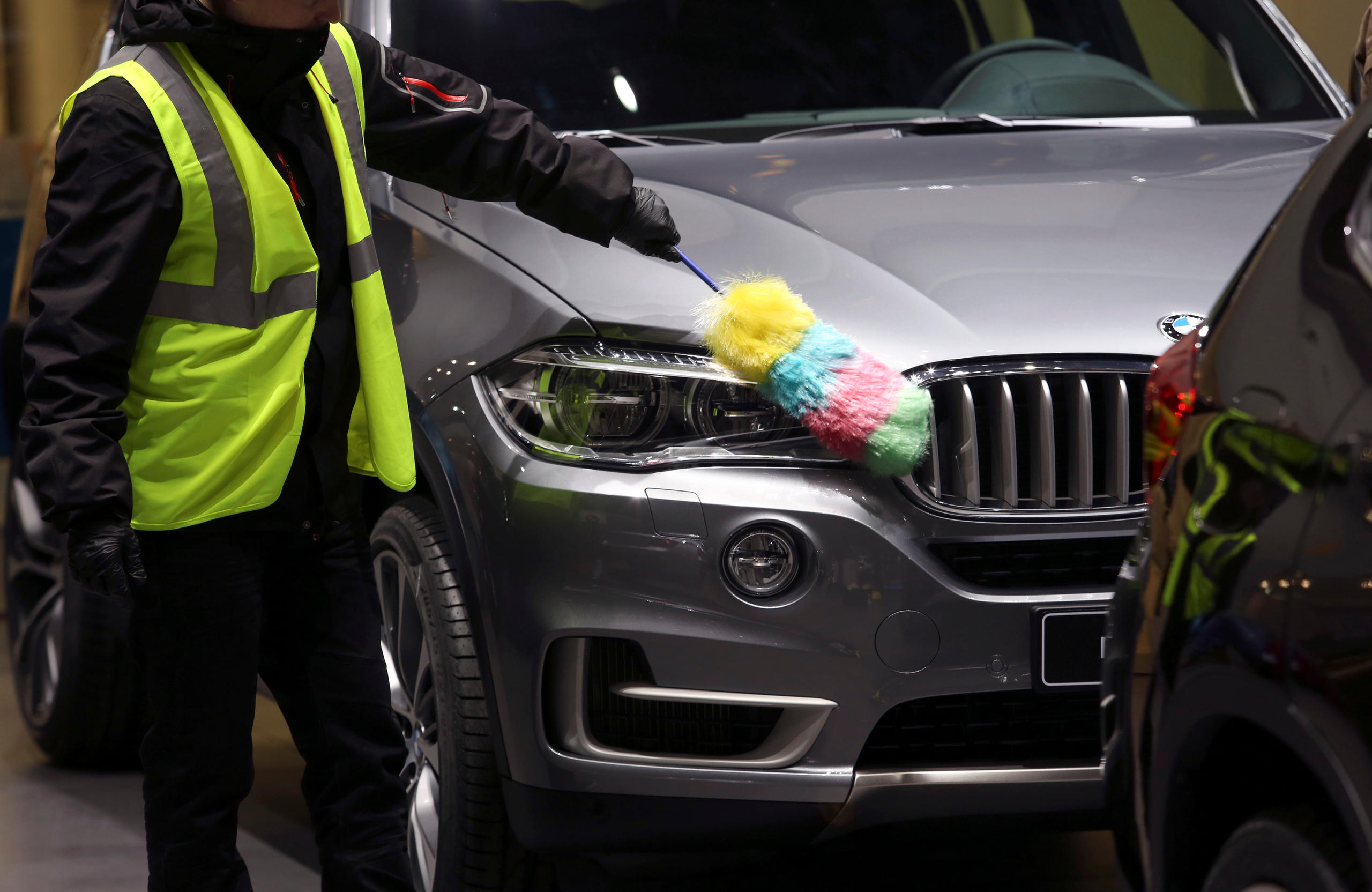
Will Swiss cities copy Paris decision to hike parking charges for SUVs?

Parisians voted last weekend to triple parking costs for sports utility vehicles (SUVs) as the city aims to tackle air pollution and the climate crisis by targeting the popular large cars. Other cities are monitoring the Paris plan closely, including in Switzerland.
More than 54% of the votes cast in the low-turnout French public consultation on February 4 backed the drive by Socialist Mayor Anne Hildalgo to triple parking fees for large SUV drivers from out of town to €18 (CHF16.90) per hour in the city’s centre. Only 5.7% of the 1.3 million eligible voters cast ballots.
Hidalgo had argued that the bulky 4x4s take up too much space on narrow Parisian streets, are too polluting, “threaten our health and our planet” and cause more traffic accidents than smaller cars.
The higher parking fees would apply to vehicles over 1.6 tonnes with a combustion engine or hybrid vehicles, and over two tonnes for electric vehicles. The move would not apply to Paris residents’ parking.
Global SUV sales have risen strongly in recent years. But the desire for vehicles with better visibility and extra comfort, safety and space have come with downsides. The shift towards bigger, more luxury SUVs in Europe has driven a trend towards new cars growing 1cm wider every two years and outgrowing the design of cities, an environmental group reportedExternal link last month. The International Energy Agency (IEA)External link has also warned that the global rise of SUVs is hurting efforts to cut emissions.
Global passenger car fleet and share of SUVs in total car CO2 emissions, 2010-2022 (light green= SUVs; blue= other cars)

The Paris vote has infuriated many French drivers. “We must firmly oppose these attacks on freedom pursued under false green pretexts,” said the motorists’ lobby group “40 millions d’automobilistesExternal link”, which has launched a petition. “If we don’t stop it now, this unjustified rebellion led by an ultra-urban and anti-car minority will spread like gangrene to other cities.”
London’s mayor, Sadiq Khan, welcomed the Paris plan and said he would monitor its effectiveness. “I’m a firm believer in stealing good policies,” he told The Guardian newspaper.
Swiss Greens seek SUV ban
The Swiss are big fans of SUVs. In recent years they have represented a growing trend, with sales doubling in five years to account for roughly half of all new cars in the Alpine country – whether petrol, diesel, hybrid or 100% electric.
“The [Paris vote] is very good news,” Raphaël Mahaim, a Green Party parliamentarian from canton Vaud, told the 24heures newspaper.
“The increase in this type of vehicle in our cities brings many difficulties. In addition to the occupation of space, there is also a safety concern, because these cars, which are heavier, longer and wider, represent a greater danger for pedestrians and cyclists,” he declared.
“Cars are becoming heavier and heavier, and therefore they consume and pollute more. We don’t need these in our cities, it’s an aberration.”
He is a co-signatory of a motionExternal link calling for an import ban on large SUVs (over two tonnes) in Switzerland which was proposed by other Green Party colleagues last year. The Swiss government rejects the text, arguing that national measures to reduce fuel consumption must concern “all passenger cars” and points to efforts made to curb emissions under the current CO2 law.
Higher parking fees and taxes in Swiss cities?
A Swiss-wide SUV ban seems unlikely in the short term. But in the meantime, local initiatives driven by the Greens are underway in Basel, Bern and Zurich.
Several weeks ago, the parliament of canton Basel City backed a Green proposal that called for higher vehicle taxes on SUVs. The local government now has three months to outline its position.
In Zurich, “blue” paid parking spaces for residents could become more expensive for SUV owners living in the city.
“The local council is currently revising the parking permit ordinance. Our goal is to grade the fees for the blue zones based on [car] weight,” says Markus Knauss of the Zurich Green Party. The proposal could be presented to the city’s parliament this year.
In the Swiss capital Bern, the Greens are also battling for higher parking fees for SUVs.
Martin Winder, head of transport projects at the Transport and Environment AssociationExternal link, would also like to see higher parking fees or higher charges being imposed on SUVs in Switzerland.
“The trend towards ever larger cars is problematic in many respects. Larger cars consume more energy, emit more CO2 and generally have a greater impact on the environment than smaller cars. Larger cars are also a danger to road safety, especially for people travelling on foot and by bike, and particularly for children,” he told SWI swissinfo.ch.
“These cars need more space, which is very scarce, especially in cities. At the same time, hardly anyone in cities is dependent on large SUVs.”
Roadblock against SUV measures
But there is resistance to any Swiss measures targeting SUVs.
Christoph Wolnik, spokesperson for the Swiss car importers association Auto-SchweizExternal link, told SWI swissinfo.ch that an SUV import ban would most probably be contested in Switzerland, where people were “less ideological”.
“Swiss transport policy is not only the responsibility of the cities but also of the cantons and the federal government,” he said, adding that Swiss cities could not be compared with a metropolis like Paris.
Benjamin Giezendanner from the right-wing Swiss People’s Party also rejected the idea of making Swiss SUV drivers pay more.
“Many people depend on SUVs, whether families or craftsmen. Higher taxes based on weight also make no sense because drivers of electric cars would also be asked to pay,” he told 20Minuten. “This is symbolic left-wing politics that doesn’t help anyone.”
Car expert Ferdinand Dudenhöffer, director of the German Automotive Research Centre in Bochum, Germany, doesn’t think Swiss cities will be able to enforce bans on SUVs.
“But in the big cities, the issue of imposing conditions and charges on large vehicles or large SUVs will be on the agenda,” he told Tagblatt.ch.
The issue is that with SUVs coming in many shapes, sizes and engine sizes, questions remain over the precise definition of a “large” SUV and how any measures can be controlled, Dudenhöffer added.
Edited by Marc Leutenegger/ts

More
The growing Swiss love affair with 4x4s

In compliance with the JTI standards
More: SWI swissinfo.ch certified by the Journalism Trust Initiative































You can find an overview of ongoing debates with our journalists here . Please join us!
If you want to start a conversation about a topic raised in this article or want to report factual errors, email us at english@swissinfo.ch.